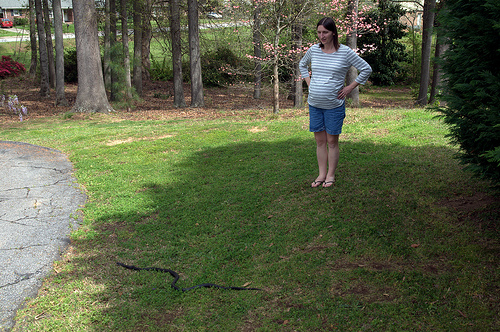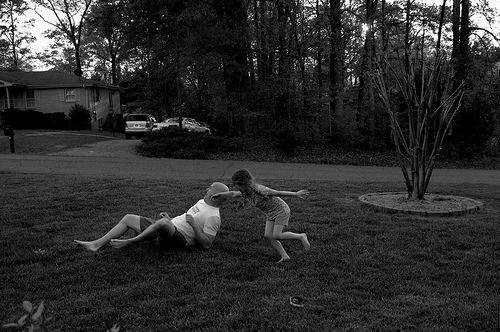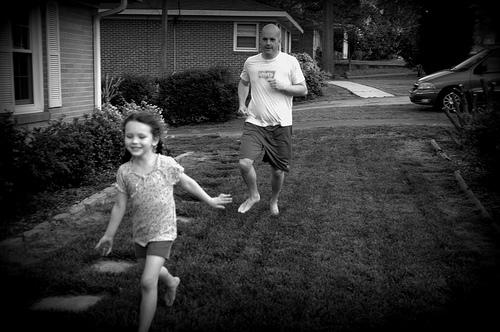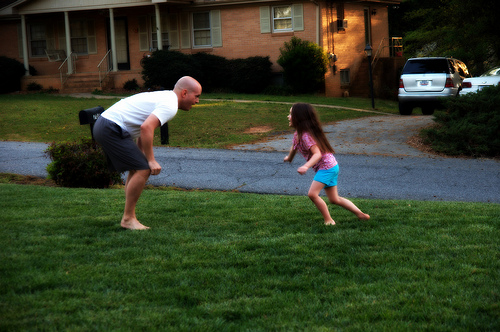In a Pickle
It’s a bold idea that only a winter-hardened Polish woman could come up with. It’s more Eastern Europe that a consonant cluster. We need only imagine the ground, frozen solid for months, is covered with snow as a scarfed babcia digs about in the cellar for something to use in soup. She happens upon a store of cucumbers preserved in brine — pickles to us, but since everything in the East is pickled, it makes little sense to single one veggie out for distinction like that.
Whatever the series of fortunate events, Polish pickle soup is a reality, and now that we know the Girl likes pickles — “I eat them at school with my lunch!” she smiles — we have a new soup in our regular line-up.
A recipe for those interested is here, though I don’t vouch for it. It’s not what K uses — she freestyles!
The Arrival of the Camper
Lenten Fail, Redux
I’m not even keeping track of the days, let alone posting on time…
Afternoon Play
Summer always had a dream-like feel to it when I was a young kid. Even though it seemed never to arrive, it had an aura of endlessness once it finally did. Two and a half months seem a lot longer when you’re five.
And waiting for summer vacation when the weather is already warm and everything around you is beginning to scream, “It’s summer!” (even though it’s technically spring) makes for itchy feet.
So we decided to get a jump on summer today, though, with some tag in the front yard. We ran around the yard, fell on each other, and rolled around in the grass, winded and sure that the moment would last for ever.
At least I was sure. The Girl, not so much. She was up again, ready to go.
“Come on, Tata! I’m it!”
Arrival
Atypical Saturday (Lent 2012: Day 32)
Saturday has a morning ritual that never changes. It begins with some Skyping to Babcia and Dziadek in Poland. The Girl carries on two-thirds in English, a bit in Polish, and the rest in squeals and laughs. Ballet follows, with me heading to a nearby McDonald’s for a coffee and some paper grading. Returning home, it’s time for polski cwiczenia, Polish practice. Saturday after Saturday it’s the same, in ordinary time, Advent, Lent, or Easter.

A five-foot visitor in our backyard, though, is hardly an every-Saturday occurrence. If it were, I think we might be seeing less of Nana (and, by proxy, Papa).

A black rat snake Pantherophis obsoletus, this fellow came slithering along our side yard, and I noticed him just as he was winding his way among the Leyland cypresses that shield our deck from neighboring yards.

K was simultaneously fascinated and repulsed, wondering aloud whether I should kill it.
“Of course not!” I declared. “This guy eats rats, mice, chipmunks, squirrels, and a host of other things I’d gladly do without.” But as a compromise, I took a pitchfork and scooted him down to the edge of our property where he promptly wound his way into an extremely large azalea, curling around the branches until it was four or so feet in the air.

Returning to the upper part of our yard, I discovered some moss that appears to have sprouts. First a snake, then odd moss — who knew what else might come our way.

Yes, a very tenuous Lenten connection. Still, one can’t say I didn’t try.
Lent 2012: Day 31
 Lent is about sacrifice, and a significant part of our everyday reality is sacrifice in the form of delayed gratification, when we sacrifice the immediate satisfaction of our desires for some further, greater good. For example, we could buy that new camera lens we want (and I have been drooling over Nikon’s 17-55 2.8 for some time) on credit and have immediate gratification; delaying said gratification by saving for the lens (and at $1,500, that particular lens would take quite a bit of saving of my personal spending money) means not racking up unnecessary debt that could hurt us in the long run. So we delay gratification for a good that is even further in the distance, and in this case, hypothetical. But the immediate price is a sacrifice of potential joy.
Lent is about sacrifice, and a significant part of our everyday reality is sacrifice in the form of delayed gratification, when we sacrifice the immediate satisfaction of our desires for some further, greater good. For example, we could buy that new camera lens we want (and I have been drooling over Nikon’s 17-55 2.8 for some time) on credit and have immediate gratification; delaying said gratification by saving for the lens (and at $1,500, that particular lens would take quite a bit of saving of my personal spending money) means not racking up unnecessary debt that could hurt us in the long run. So we delay gratification for a good that is even further in the distance, and in this case, hypothetical. But the immediate price is a sacrifice of potential joy.
The Girl has been saving for a Barbie camper for months now. Granted, it only began a little before Christmas, but five-year-old time is like dog-years: it’s all relative. She gets a little cash here and there, from us and her grandparents, and this week, she made it: $70, the Wal-Mart website price.
So this evening, we went to Wally-world to buy it, only to find the price there was $94. I took it to customer service to inquire about the justification for the price difference. It turned out, they were aware of it — and they did nothing about it.
“We’ll price-match with a competitor…” began the customer service rep.
“But not with yourself,” I finished.
“Right. Not even store to store.”
I sensed a crisis brewing, but the Girl handled it marvelously: a few whimpers of disappointment but nothing significant.
Back home, we shopped around and found it on sale for $50. And now the Girl has a good start on her savings for a Barbie house — and a lesson learned about delayed gratification.
Lent 2012: Day 30
There is always one bright thought in our minds, when all the rest are dark. There is one thought out of which a moderately cheerful man can always make some satisfactory sunshine, if not a sufficiency of it.
Sometimes, I wonder. Some of the students I work with on a daily basis seem to have few bright images in their minds. Life is a constant crisis for them: everything from someone bumping them in the hallway to a perceived injustice from a teacher sets them off. They wear a scowl on their faces most of the time, and life seems to be one big trial for them.
Faber, in the quote above, is speaking of the belief in a joyous afterlife, but sometimes I wonder about the usefulness of that hope for someone who’s already lost all hope for a happy life here and now, and all by the age of fourteen.
The quoted excerpt is from Father Frederick Faber’s Spiritual Conferences, excerpted here.
Lent 2012: Day 29
No one was ever corrected by a sarcasm; crushed perhaps, if the sarcasm was clever enough, but drawn nearer to God, never.
Fr. Frederick Faber
Cat Tails
Lent 2012: Day 28
Conversation often turns into an excuse to discuss oneself, and talking with someone who seems to have a knack for turning the conversation back to himself is exhausting.
The unselfishness of speedily and gracefully distracting ourselves from self is also singularly difficult to practice.
Yet it’s somehow a natural conversational occurrence. Whether it’s a sincere desire to help someone by sharing a similar experience or an unconscious competitive streak, we hear a story and we want to add something from our own lives into the mix. Resisting this urge is critical for what Faber calls “kind listening. But like many other kindnesses, it involves a degree of self-sacrifice.
I think of the Girl dating at some point in the future — within the next, say, 25-30 years — and one of my most deeply held requirements (as if I’d have any say) for any young man interested in her would be that he show the ability to listen. It’s a rare gift these days, and I fear it will be rarer still when the time comes.
The quoted excerpt is from Father Frederick Faber’s Spiritual Conferences, excerpted here.
Lent 2012: Day 27
There is also a grace of kind listening, as well as a grace of kind speaking. Some men listen with an abstracted air, which shows that their thoughts are elsewhere. Or they seem to listen, but by wide answers and irrelevant questions show that they have been occupied with their own thoughts, as being more interesting, at least in their own estimation, than what you have been saying. Some listen with a kind of importunate ferocity, which makes you feel, that you are being put upon your trial, and that your auditor expects beforehand that you are going to tell him a lie, or to be inaccurate, or to say something which he will disapprove, and that you must mind your expressions. Some interrupt, and will not hear you to the end. Some hear you to the end, and then forthwith begin to talk to you about a similar experience which has be fallen themselves, making your case only an illustration of their own. Some, meaning to be kind, listen with such a determined, lively, violent attention, that you are at once made uncomfortable, and the charm of conversation is at an end. Many persons, whose manners will stand the test of speaking, break down under the trial of listening. But all these things should be brought under the sweet influences of religion. Kind listening is often an act of the most delicate interior mortification, and is a great assistance towards kind speaking.
One of the curses of teaching middle school is multi-tasking one must do during certain times when a student is trying hard to clarify something that happened in class — homework, a proofreading trick, a comprehension check, or any number of little things that might require some additional explanation. And these moments come, often enough, as I’m standing at the door, supervising students as they change classes. Hardly the time to be able to listen kindly.
I once had a young lady terribly upset — unbeknownst to me — because of this. She felt I was never listening to her, that I never had time for her questions. She was a most studious, hardworking girl. It took a while to work out, but I learned, again, the value of kind listening.
The quoted excerpt is from Father Frederick Faber’s Spiritual Conferences, excerpted here.
Lent 2012: Day 26
After a beautiful day yesterday, it seemed only appropriate that this morning begins with rain — a drizzle that suggests an afternoon movie and, if we’re lucky, a nap. But by noon, it’s sunny, and the backyard calls.

There, we find that the cabbage in the backyard planter, growing since sometime in October or November, has reached the point that putting off consuming it would be almost wasteful — at the very least, it would hint of sin.

So what’s a Polish girl to do but make a surowka out of it — basically, a vinegar cole slaw. The Girl helps with the sauce/marinade. But that only keeps us busy for so long: our newly discovered park is only four miles away, so K packs some fruit while I entertain the Girl in the swing, then just before four, we head out.

We take a different route, with a trail head buried in the back of a Little League park I’ve passed almost every day for five years. Who knew?

Same park, different sights.

A quick stroll through the woods brings us to the lakeside and a small observation platform built out into the water.

With the temperature and the amount of green, it’s difficult to believe that spring is still technically two days away. And from what I’ve been reading, it seems to be the same situation through most of the States.

“If it’s this warm now, what will it be like in August?” people wonder, as if weather had a cumulative effect.

Cumulative effect or not, there is a cumulative effect of all this walking: a tired, fussy girl who’s ready to head home and get some food. We make it across the largest bridge in the park just to sit long enough to decide it’s time to head back

counting and noting the steps along the way.

And what does this have to do with the twenty-sixth day of Lent?

With an end like this, does it really matter?
Lent 2012: Day 25
Lent 2012: Day 24
[Sharing kind words] involves very little self-sacrifice, and for the most part none at all. It can be exercised generally without much effort, with no more effort than the water makes in flowing from the spring. Moreover the occasions for it do not lie scattered over life at great distances from each other. They occur continually. They come daily. They are frequent in the day. All these are commonplaces.
Just ask my students. And my wife. And my daughter.
The quoted excerpt is from Father Frederick Faber’s Spiritual Conferences, excerpted here.
Lent 2012: Day 23
Looking back — oops.
Does it count if I post it a day later? Wouldn’t be the first time…
Lent 2012: Day 22
Kind words will set right things which have got most intricately wrong. In reality an unforgiving heart is a rare monster. Most men get tired of the justest quarrels.
If I could teach my students one extra-curricular lesson, it would be this. I have calmed furious students (sometimes furious at me, most often furious about something some peer has done) with a few kind words so often that it has become almost instinctive: “Get the kid away from the situation and say something kind.” A smile helps as well.
Yet they re-enter the same quarrel, sometimes only hours later (occasionally, even more quickly), and I can see a certain Sisyphean fatigue in them as they fuss. “A calm answer…” I mutter to myself, wondering if I can teach that by example alone.
The quoted excerpt is from Father Frederick Faber’s Spiritual Conferences, excerpted here.
Cabinet
Lent 2012: Day 21
Criticism — being mean, in a sense — can be fun. We seem to show off a bit of our mental acumen. “Good one!” people cheer on when someone makes a particularly wittily barbed comment. It’s what “the dozens” is all about. So giving up that potential scoring comment is a form of self-denial — a big idea in Catholicism.
Faber explains it better:
The practice of kind thoughts also tells most decisively on our spiritual life. It leads to great self-denial about our talents and influence. Criticism is an element in our reputation and an item in our influence. We partly attract persons to us by it. We partly push principles by means of it. The practice of kind thoughts commits us to the surrender of all this. It makes us, again and again in life, sacrifice successes at the moment they are within reach. Our conduct becomes a perpetual voluntary forfeiture of little triumphs, the necessary result of which is a very hidden life.
That seems to be a good definition of magnanimity.
The quoted excerpt is from Father Frederick Faber’s Spiritual Conferences, excerpted here.


















